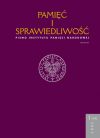Ostiary i nie tylko. Lotnicy polscy w operacjach specjalnych SIS, OPC i CIA w latach 1949–1965
“Ostiary” and Beyond. Polish Airmen in Special Operations of SIS, OPC and CIA in the Years 1949–1965
Author(s): Franciszek GrabowskiSubject(s): History
Published by: Instytut Pamięci Narodowej
Summary/Abstract: “Ostiary” is the code name of a programme under which, in the period 1949–1958, airmen of East European countries, mainly Poles, were used to crew planes performing special operations. This was a part of the “Rollback” operation – an attempt to create armed opposition in the USSR and in its dependent countries. Flights to the territory of Albania, Bulgaria and Romania were operated from an air base in Athens. Nationalist Belarusian and Ukrainian organisations, as well as guerrilla groups in the Baltic states and Poland (5th headquarters of WiN – (Wolność i Niezawisłość – Freedom and Independence organisation) were being supplied from a base in Wiesbaden. The “Rollback” operation was a failure – most of operations were completely infiltrated by the communist counterespionage. It did not, however, mean the end of the transfer of agents. Such operations started in the mid-1950s. This time however, the task of agents was to conduct espionage activities. Transfer of the Russian NTS agents (Narodno-Trudovoy Soyuz – National Alliance of Russian Solidarists) is an example of such operations. At that time two independent programmes were launched. The first consisted of the development of the U-2 reconnaissance aircraft with the participation of Polish airmen. The second was an attempt to hijack from the territory of Poland a MiG-15 aircraft by specially trained Polish airmen. The hijacking was not successful. Some of the airmen that were to take part in it were included in “Ostiary”. After the end of air drop operations, the Polish airmen were re-trained to fly RB-69A aircraft and perform photo and radio-electronic reconnaissance on Warsaw Pact countries. These airmen were “borrowed” twice to carry out operations in Tibet and Indonesia. As a result of British protests against the use of United Kingdom citizens in secret operations, the “Ostiary” programme was abandoned in 1958. A number of the airmen changed their citizenship and were employed by CIA to take part in operations against Cuba and in the Congo.
Journal: Pamięć i Sprawiedliwość.
- Issue Year: 14/2009
- Issue No: 1
- Page Range: 305-341
- Page Count: 37
- Language: Polish

